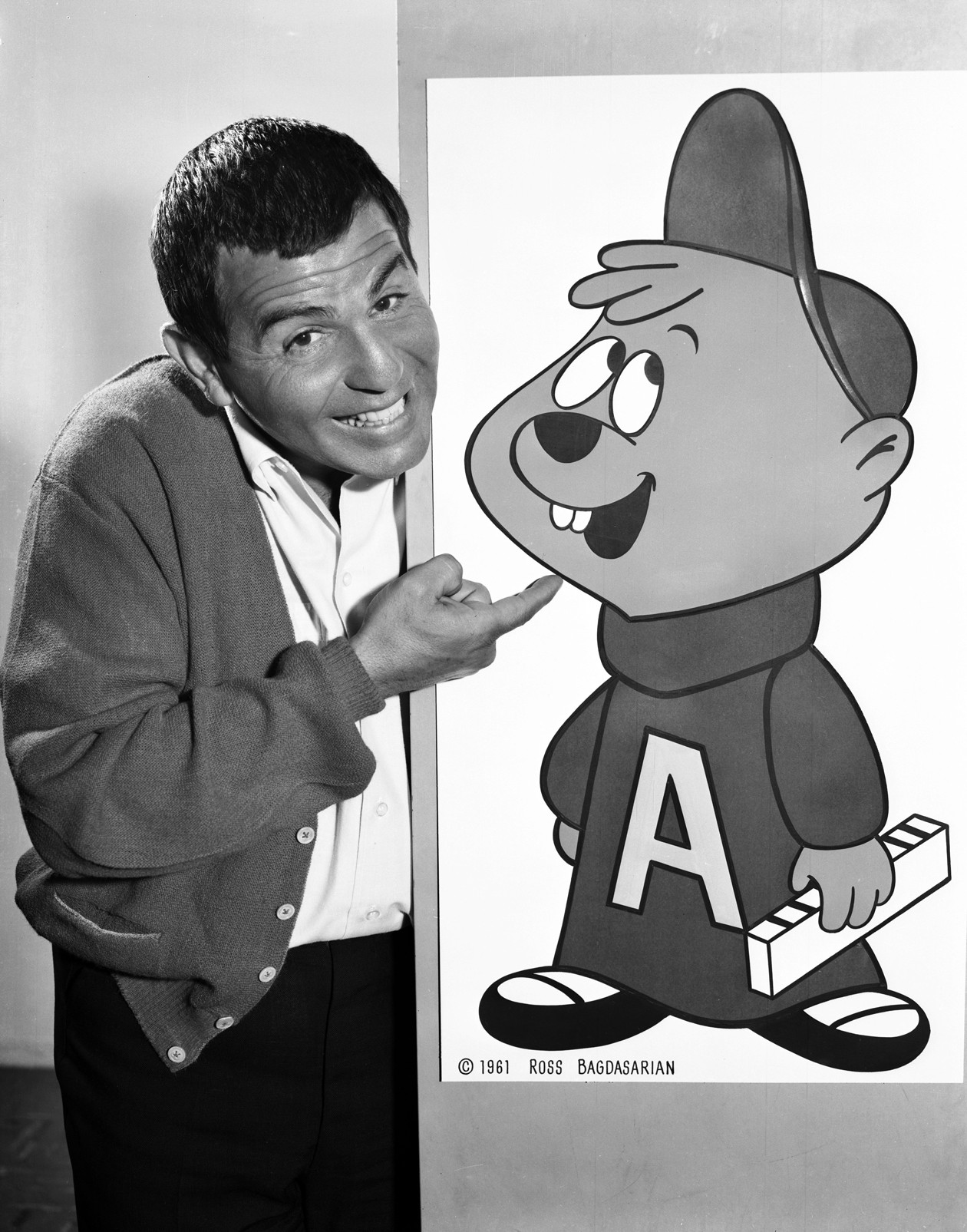Exactly 65 years ago, the world was introduced to a Christmas novelty song that would become a cultural phenomenon: “The Chipmunk Song (Christmas Don’t Be Late)” by Ross Bagdasarian, Sr. Released on December 1, 1958, this track, featuring uniquely high-pitched voices created in a recording studio, not only topped the Billboard Hot 100 chart within three weeks but also launched the Alvin and the Chipmunks franchise into a multi-million dollar empire. The song’s initial success was just the beginning, quickly earning three Grammy Awards and selling millions of copies, cementing its place in music history.
Ross Bagdasarian Jr., son of the original creator, Ross Bagdasarian Sr., who passed away in 1972, reflects on the unusual origin of these cartoon icons. “They were born from a No. 1 song, which is unusual for most cartoon characters,” he notes, highlighting the unique foundation of Alvin, Theodore, Simon, and their perpetually exasperated human companion, David Seville.
The infectious holiday tune, “Alvin And The Chipmunks Christmas Song”, has evolved far beyond its initial record sales. It has grown into a sprawling cartoon universe encompassing blockbuster movies with hit soundtracks, beloved animated TV series, Taylor Swift-esque re-recordings, and a vast array of merchandise. The franchise boasts a platinum-selling album from the Alvin and the Chipmunks movie soundtrack and a gold-selling album from Alvin and the Chipmunks: The Squeakquel. Furthermore, the four live-action Chipmunks theatrical films, starting with 2007’s Alvin and the Chipmunks, have collectively grossed $656 million domestically and nearly $1.4 billion worldwide, according to Box Office Mojo. Bagdasarian Jr., who, along with his wife Janice Karman, has produced these films and voiced some of the chipmunks, emphasizes, “It wasn’t just that it was a song. It created characters and personality.”
Ross Bagdasarian Sr.’s business acumen was evident from the start as he shrewdly retained all rights to this incredibly lucrative Christmas track – master recording, publishing, and product licensing. (He later relinquished the master rights in the late 1960s.) Billboard estimates that “The Chipmunk Song” continues to generate around $300,000 annually from master recording and publishing royalties. The song has amassed an impressive 112.4 million on-demand U.S. streams, with over half of these occurring during the November-December holiday periods of the past five years, according to Luminate. Remarkably, in December alone last year, the song was streamed 10.4 million times. Digital track sales are also substantial, with nearly 665,000 sold, and the Chipmunks’ album sales history is equally impressive, totaling 50 million albums from 1965’s Chipmunks A Go-Go to 1980’s Chipmunk Punk.
 Billboard Christmas Songs
Billboard Christmas Songs
Billboard’s staff picks for the 100 best Christmas songs of all time.
Bagdasarian Jr. and Karman, who hold a law degree from Southwestern Law School, manage Bagdasarian Productions in Santa Barbara, California, established in 1981. Initially, their vision was to create original films and shows, but the Chipmunks’ magnetic pull led them to refocus, starting with Chipmunk Punk.
Reflecting on the 65th anniversary of “The Chipmunk Song,” Bagdasarian Jr., aged 74, shared in a phone interview, “And here we are, almost 50 years later, trying to come up with the next new idea for Alvin and the Chipmunks, from TV shows to movies to another TV series that we just finished last year.” This ongoing creativity underscores the timeless appeal of Alvin and the Chipmunks Christmas music and the characters themselves.
When asked about the unique essence of “The Chipmunk Song,” Bagdasarian Jr. offers a personal and insightful perspective. “I am pulled back to 1958, with my brother and sister and I being called into my dad’s den, where he would record these demos before he went into the studio to do a more polished version. We would hear not only the charm of the song but the personality of Alvin, talking back to him, as only a four-or-five-inch tiny chipmunk could do to a large man. Parents understand how frustrated and exasperated Dave would be with Alvin, and kids love identifying with Alvin because he’s got that spunk and that sass and he’s not afraid to go, ‘Hold on a second.’ Just that little rebellious, mischievous nature.” This description perfectly captures the dynamic that has resonated with generations of listeners.
 Ross Bagdasarian, Sr., creator of Alvin and the Chipmunks.
Ross Bagdasarian, Sr., creator of Alvin and the Chipmunks.
Ross Bagdasarian, Sr., the creative mind behind Alvin and the Chipmunks in 1961.
Bagdasarian Jr. also shared anecdotes about his own personality in relation to the characters, revealing, “I was more of the Simon character. Very dutiful. I was the one [who] really wanted my dad to be proud of me. So if there was a chore to do, let me wash his car or something. My younger brother Adam was the rebellious one. But I think he might have been rebellious on his own. I don’t know if he needed any prompting from Alvin.” This personal touch provides a charming glimpse into the family behind the phenomenon.
The Bagdasarian family’s complete ownership of the song’s rights—publishing, recording, and licensing—is a testament to Ross Bagdasarian Sr.’s foresight in the 1950s. Bagdasarian Jr. explains, “My dad was one of the first folks — you’re talking about in the ’50s — that not only owned the publishing rights to the song but he also owned the master itself. That was something that no artist was really doing back then.” He further reveals a fascinating connection to music mogul Berry Gordy Jr., stating, “Berry Gordy [Jr.], when he founded Motown, he had mentioned over the years [in private], ‘Well, when I found out that Ross Bagdasarian could own his own masters, I went from writing songs for people to developing a record label so I could own those masters, as Ross Bagdasarian had done.'”
Despite relinquishing phonograph rights to the masters in the late ’60s (now controlled by Universal Music Group through Capitol-EMI), the family retains master recording rights for movies, television, toys, and commercials. Bagdasarian Jr. clarifies the current royalty landscape, “So if anyone streams ‘The Chipmunk Song,’ the master royalty goes to Capitol-EMI, now owned by Universal Music Group, not to your family? That’s right. Fortunately or unfortunately, these days, 8 billion [plays] on Spotify would still amount to 17 cents. So it’s not a payment we actually miss.” He humorously downplays the streaming revenue in comparison to the more significant income streams from licensing and publishing. However, it’s worth noting that Billboard’s royalty calculator estimates 8 billion Spotify plays to be worth closer to $38 million, highlighting the substantial scale of streaming revenue, even if it’s not the primary focus for the Bagdasarian family concerning this particular song’s master recording royalties.
The real financial engine for “The Chipmunk Song” remains in licensing and publishing, particularly for movies and franchise-related products. Bagdasarian Jr. confirms, “As far as the song is concerned, that is fair to say. The song has probably sold 20 million records, maybe more, because it sold 4.5 million records in the first seven weeks back in 1958.” He also affirms family ownership of both publisher and artist shares of the publishing rights, held by him and his wife.
Reflecting on his father’s lessons, Bagdasarian Jr. shares a fundamental life principle rather than specific music business advice: “The most important thing that my dad ever said [was], ‘Listen, your word is all you will ever really have.’ Had he lived a little longer, he would have added a caveat: ‘Your word is your bond, but don’t expect that from everybody else that you meet.'” He recounts experiences where verbal agreements weren’t honored by record companies, underscoring the importance of written contracts in the industry, a lesson learned in contrast to his father’s emphasis on personal integrity.
 Ariana Grande and Kelly Clarkson
Ariana Grande and Kelly Clarkson
Kelly Clarkson and Ariana Grande, artists mentioned in a related Billboard article about holiday hits.
When asked about his feelings hearing “The Chipmunk Song” every Christmas season, Bagdasarian Jr. concludes with heartfelt sentiment: “Honestly, I am so thrilled every time, because it brings back my dad. I get to hear his voice.” This personal connection to the song, intertwined with the legacy of his father, is perhaps the most enduring magic behind the “alvin and the chipmunks christmas song,” ensuring its continued popularity and cherished place in holiday music for years to come.

